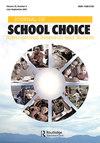The Intervention Strategies of Resource Persons Monitoring Home Education: A Typology and A Questionnaire
Q2 Social Sciences
引用次数: 2
Abstract
ABSTRACT In Quebec (Canada), a new normative framework and the COVID-19 pandemic have precipitated the hiring, by the ministry of education, of at least a hundred new resource persons to monitor home education. According to international writings, these professionals are at the crossroads of normative, political, and educational conflicts. Our literature review reveals that these resource persons might solve such conflicts by adopting some of ten typical intervention strategies: mutual understanding, tolerance of disagreement, search for the child’s interest, creativity, competency development, negligence, abuse of power, protection of their professionality, incontestability, and distrust. A questionnaire was constructed on the basis of this typology, aimed at supporting the study of their interactions with families.资源人员监控家庭教育的干预策略:类型学与问卷调查
摘要在加拿大魁北克省,一个新的规范框架和新冠肺炎疫情促使教育部雇佣了至少一百名新的资源人员来监督家庭教育。根据国际著作,这些专业人士正处于规范、政治和教育冲突的十字路口。我们的文献综述表明,这些资源人员可以通过采取十种典型的干预策略来解决这些冲突:相互理解、容忍分歧、寻求孩子的兴趣、创造力、能力发展、疏忽、滥用权力、保护他们的专业性、无可争辩和不信任。在这种类型的基础上编制了一份问卷,旨在支持对他们与家庭互动的研究。
本文章由计算机程序翻译,如有差异,请以英文原文为准。
求助全文
约1分钟内获得全文
求助全文

 求助内容:
求助内容: 应助结果提醒方式:
应助结果提醒方式:


